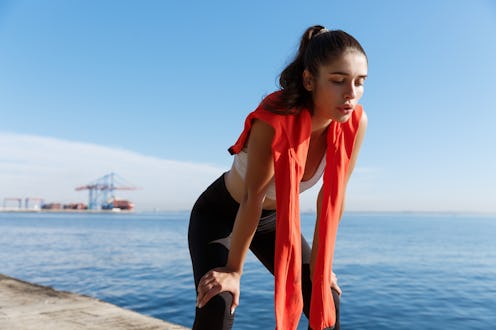Wellness
Experts Explain Whether You Should Work Out When You Have Allergies
Your nose may be running, but should you?

The sun is shining, the flowers are blooming, and... your throat is itching. Spring is here, and with it comes seasonal allergies, which can make you miserable with symptoms like irritated eyes, a runny nose, sneezing, and fatigue. And while these symptoms can be uncomfortable, it can be hard to tell whether resting or going about your usual activities is the best option — so, can you work out with allergies?
If you have to keep your box of Kleenex close throughout spring, you’re in good company — as many as 60 million people in the U.S. cope with seasonal allergies thanks to excess pollen in the air, according to data from the Centers for Disease Control and Prevention. Luckily, allergies aren’t contagious: It’s your immune system overreacting to the unfamiliar particles. Cue the congestion.
Nonetheless, it can be hard to deduce whether it’s better to deal with your allergies by resting or sticking with your exercise routine. To help, experts explain whether you should work out with allergies or if you should sit on the sidelines until they’ve passed.
Can You Work Out When You Have Allergies?
Short answer? Yes, says Kanani Stephens, a registered nurse with a degree in exercise physiology and co-founder of wellness brand Plant Love Naturals. Just make sure your allergies are under control before you get your sweat on, cautions Dr. Purvi Parikh, MD, an allergist with Allergy & Asthma Network. Working out while your asthma is acting up, for example, could trigger an attack. And, if your seasonal allergies aren’t responding to medicine, she recommends holding off until your symptoms are manageable to avoid aggravating your condition. But if you’re dealing with run-of-the-mill hay fever and are feeling up to a workout, exercising is fine, says Stephens.
Parikh recommends sticking to indoor workouts so that you can avoid pollen or other allergy triggers — and thereby exacerbating your symptoms — while out on a jog or bike ride. Just be sure to keep an eye on your symptoms while you exercise, Stephens adds. If things take a turn for the worse — i.e. you feel shortness of breath rather than just a stuffy nose — it could be a sign that you’re dealing with something more serious than allergies, like an infection or flu, in which case it’s best to consult with your doctor.
Does Exercise Help Allergies?
While your daily sweat sesh won’t cure your allergies, it can sometimes help you get through the thick of it, says Stephens. Science suggests that stress can actually make your allergies worse, potentially by amplifying your emotional response to unpleasant symptoms or by adding to the physical toll on your body. Luckily, regular exercise can boost your mental health. Research shows that it releases feel-good chemicals in your brain to help reduce stress, anxiety, depression, and also improves your cognitive function. So what better way to soldier through a stuffy nose than by taking care of your mental wellbeing?
Exercise can also help boost your immune function, she adds. Though this won’t magically fix your allergies, a strong immune system can help ward off other illnesses that could make you feel even crappier.
When You Should Rest
That said, there are certain cases where it’s better to skip the gym, says Stephens. In general, if you’re feeling too run-down or unwell to exercise, then she advises to listen to your body because it’s telling you that you need to rest. Parikh also recommends the “below the neck” rule to gauge whether or not you should get your sweat on: If you develop any symptoms below your neck — like a chest cough, chest tightness, increased heart rate, fever, or body aches — then it’s best to take it easy until those issues subside so you can recover from the allergies or, if you have asthma, avoid an attack.
Studies referenced:
da Silveira, M. (2020). Physical exercise as a tool to help the immune system against COVID-19: an integrative review of the current literature. International Journal of Clinical and Experimental Medicine, https://www.ncbi.nlm.nih.gov/pmc/articles/PMC7387807/
Di Liegro, C. (2019). Physical Activity and Brain Health. Genes, https://www.ncbi.nlm.nih.gov/pmc/articles/PMC6770965/
Kiecolt-Glaser, J. (2009). How Stress and Anxiety Can Alter Immediate and Late Phase Skin Test Responses in Allergic Rhinitis. Psychoneuroendocrinology., https://www.ncbi.nlm.nih.gov/pmc/articles/PMC2819057/
Sharma, A. (2006). Exercise for Mental Health. Primary Care Companion to the Journal of Clinical Psychiatry, https://www.ncbi.nlm.nih.gov/pmc/articles/PMC1470658/
Experts:
Purvi Parikh, MD, an allergist with Allergy & Asthma Network
Kanani Stephens, RN, a registered nurse with a degree in exercise physiology, and co-founder of wellness brand Plant Love Naturals